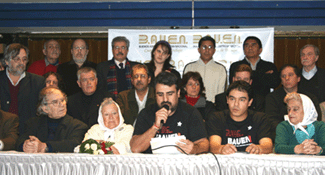Scotland
Saturday 1 December
11am to 5pm
Quality Central Hotel
Hope Street
Glasgow
Speakers include:
Bob Crow (RMT and Janice Godrich (PCS)
http://www.shopstewards.net/NSSNleaflet_Layout%201.pdf
Leaflet at www.shopstewards.net
Sunday 28 October 2007
1891 Introduction by Frederick Engels
Twentieth Anniversary of the Commune
http://www.marxists.org/archive/marx/works/1871/civil-war-france/postscript.htm
http://www.marxists.org/archive/marx/works/1871/civil-war-france/postscript.htm
Sunday 21 October 2007
French Workers Strike Back — 18 October

French Workers Strike Back — 18 October
Author: Ed Maltby
French rail, gas, and electricity workers are striking on 18 October over pensions, privatisation and their right to strike. The new right-wing French President, Nicolas Sarkozy, has bitten off more than he can chew.
So desperate is Sarkozy to prove himself to right-wing voters and his party, the UMP, he plans to destroy as quickly as possible all of the gains won by French workers since the war; gains which the French working class has been able at least partially to defend throughout the 1980s and 90s, while other European workers were suffering a series of defeats.
Sarkozy wants to break the strength of the railway workers’ unions, and strip transport and energy workers of their “special regimes” — a raft of pension benefits won decades ago, which allow workers to retire at 55 on a full pension. The last time a minister tried to do that was in 1995, when Alain Juppé's attacks on these workers resulted in a month of massive strikes and a major victory for the unions. Sarko’s vaulting ambition may be catapulting him straight towards a replay of that battle.
The unions who organise workers on the state rail company (SNCF) and Paris public transport (RATP) haven’t forgotten the lessons they learned in 1995. Although many older workers have retired since then, the new workers who were still at school in 1995 are militant and as organised.
Tensions have been since Sarkozy’s government decided in August to close 268 stations and shift their freight capacity on the rails. Workers were also angered by new “minimum service” legislation, which attacks the right to strike by obliging individual workers to tell their boss 48 hours before a strike whether or not they will be taking part.
Mass meetings have been held at workplaces across France, with very high attendances. At a recent such “general assembly” at the Quatre-Mares depot in Rouen, 450 workers out of a total of 750 were in attendance. The final straw came in September, when Sarkozy announced his intention to break the “special regime”.
Sarkozy is also copying the press strategy of the Brown government and the Metronet bosses, by trying to drive a wedge between passengers and rail workers. He has publicly attacked “privileged railwaymen” who are “taking the rest of us hostage”. French workers and socialists reply that it is the government who are causing the real disruption: by gutting public services and attacking workers’ right to strike, and it is they who are “taking the rest of us hostage”!
The electricity (EDF) and gas (GDF) company workers announced in September that they too would be joining the rail workers in going out on strike on 18 October. They too will be hurt badly by an attack on the special regimes. Moreover, following the part-privatisation of both of these companies, forcing them to compete with each other, hundreds of jobs are being cut, or moved into insecure employment in call centres as the companies “rationalise”. Energy workers have announced that they will strike together to defend public services and employees’ pensions.
One theme which runs throughout the build-up to this strike is grassroots worker self-organisation. It is the workers themselves who are organising general assemblies, making the political arguments about public services and the right to strike; and forcing their union bureaucracies into action. The unions which organise the energy workers, for example, have said nothing about privatisation or public services: their only complaint to the government is that the proposed pension changes have “not been negotiated”.
It is the grassroots militants who are driving this campaign and giving it a political character. They have forced the unions into action, and they have forced the CGT to call a demonstration on 18 October.
We should support these strikes, and learn from them: that the bosses must not be allowed to divide passengers and workers; and that only solid grassroots organisation can create fighting unions and deliver political change — not union bureaucracies
Tuesday 9 October 2007
Subscribe to:
Posts (Atom)




